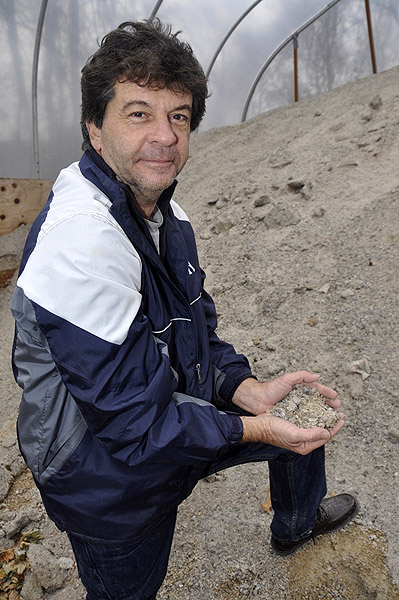
It is impossible to melt ice without salts and the crucial chlorides within them. But Dave Schiavoni has found a way to beat the traditional method—with beets.
GeoMelt Natural Ice Control, a concoction of beet juice and salt water or brine, is kinder to concrete and asphalt in the colder areas of the country looking to go green, according to Mr. Schiavoni, a Sag Harbor resident who owns East End Organics in Riverhead.
Chlorides—in their calcium, magnesium or potassium chloride forms—are the problem, he said. They are added to salt, which melts up to (or, actually, below) 18 degrees above zero, in order to accelerate its deicing properties. But there is a heavy cost. They stay in the earth forever, Mr. Schiavoni said. His beet juice-based ice melt still contains salt, he emphasized, but he doesn’t need to boost it by adding more chlorides.
“Just like there’s good sugars and bad sugars, there are five positive ions that come out of the beet. Chlorides are a negative ion,” Mr. Schiavoni said during an interview at his store last week. “You still have chlorides, don’t get me wrong. You can never melt ice without some chloride. It’s not going to happen. But right now, everyone’s using magnesium, calcium, potassium chlorides. You’re adding more chlorides, where the beet juice takes the chlorides away as you add it.”
GeoMelt works by lowering the freezing temperature of the brine that’s normally used to de-ice roads, he said. And it’s made from the by-product of brown beets grown in the Midwest, which was previously dumped down the drain before its new use was accidently discovered about nine years ago.
“The farmers, after their two beet crops per year, had all this beet brine and didn’t know what to do with it,” Mr. Schiavoni explained. “So they were putting it on train trucks and dumping it on the ground. At a train hub in Minnesota, it was 55 below and the guy who was supposed to get rid of it forgot to, so he went over there, opened the vat and the brine came right out. It didn’t freeze. And he was like, ‘Something’s wrong.’ So they started testing it and discovered it has five positive ions.”
Mr. Schiavoni brings in the raw beet juice by the trainload, dilutes it and mixes it into a patented, organic final brew—which includes corn and anti-corrosive materials—that melts at 20 below zero and is either distributed as a liquid or granular rock salt, he said.
The latter is ideal for homeowners, he reported. It costs $9.99 for a 25-pound bag, which is about 15 percent more than a bag of regular salt.
The brown-colored, and drinkable, liquid is the way to go for public roads and municipal use, Mr. Schiavoni said. A lane mile requires about 40 gallons, and at $1 per gallon, the liquid is more cost-effective than salt, which requires 1,000 pounds per lane mile, or $50.
“The advantage of it is it gets in the little cracks and the pulp stays in there and it keeps working,” he said. “The colder it is, the better it works. If the snow is dry and cold, you only have to apply this once, instead of the salt trucks that reapply three, four times. Salt is white, this is brown. You can see it down. It’s an anti-bonding, anti-freezing agent. We guarantee, put it at all the intersections where the accidents happen and when you plow, you’ll see, there will be no snow and you won’t have black ice that night.”
To date, Riverhead Town and the villages of Sag Harbor and Southampton are on board, he said. Southampton Town makes its own brine, and East End Organics plans on treating it, he said, but Mr. Schiavoni said he recognizes the logistical roadblocks up against the beet juice ice melt’s success.
“Here’s the problem: all the towns have spreaders, not sprayers. Southampton Town just bought three of them for $32,000 each. So I invented this product,” Mr. Schiavoni said, walking over to a truck with a tank sitting in its bed. “For $599, any pickup truck is a spray truck. Each one of these does 8 to 9 miles of road. Any pickup truck now, in about three minutes, can be a spray truck. We have about 200 in stock.”
For the highway departments that bought regular rock salt last year, it’s now garbage, he reported. But for those with leftover GeoMelt, they’re in luck, he said.
“If you coat it with beet juice, watch, you can use it again,” Mr. Schiavoni said, crumbling a chunk of salt in his palm. “Last year, they didn’t use any because it was such a mild winter. If we get 28 storms this winter like they say, we’re going to be in good shape.”
Now it’s just a waiting game to put the beet juice ice melt to the test.
For more information, visit eastendorganicicemelt.com
.